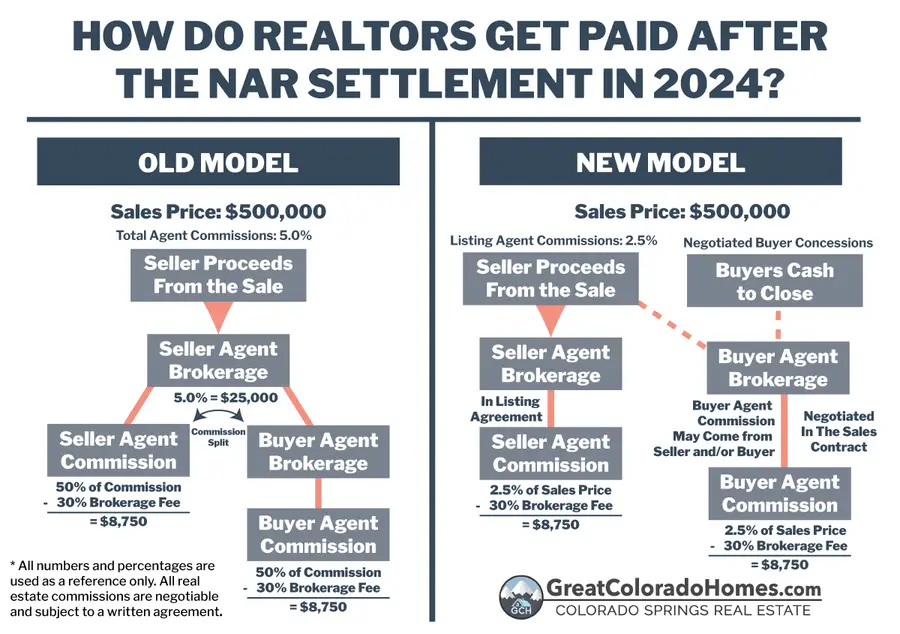Most real estate agents are paid for their services through commissions when the home sale is complete. The listing agent fees are negotiated into the listing agreement, and the buyer's agent fees are negotiated in the sales contract.
Since most buyers don’t have extra money to pay their agent, the seller often covers the buyer’s agent’s fee, either with a flat amount or a percentage of the home’s sale price.
How has Realtor Compensation Changed Since the 2024 NAR Lawsuit?
You might have heard about the National Association of Realtors (NAR) lawsuit in the news, especially about buyer agent commissions. If you're like most people, you’re wondering what this really means for the real estate market.
Some agents think it’s a big deal, while others say it’s just "business as usual." The main changes are in the paperwork and the process Realtors go through to document their commission.
Here's a chart to break it down in a simple way for you.

As you can see in the chart above, not much has changed. The new NAR rules mean that buyer's agents can no longer automatically expect to be paid by the seller, so the buyer's agent's commission now needs to be negotiated.
One slight shift is that buyer's agents may now receive their commission from the buyer directly. Funny enough, this has always been an option, buyers have always had the choice to pay their agent if they prefer. It's not common, though. I've been in real estate for 13 years, and I've never had a buyer pay my commission.
How will the new NAR rules change real estate?
 The new rules probably won’t have a huge impact on the real estate industry. We’re shifting toward a buyer’s market, meaning more homes are available, and they’re staying on the market longer.
The new rules probably won’t have a huge impact on the real estate industry. We’re shifting toward a buyer’s market, meaning more homes are available, and they’re staying on the market longer.
Since home prices are high, most buyers can’t afford to pay a buyer’s agent on top of their down payment, lending fees, and other costs. So, if a seller wants to sell their home, they’ll likely still need to offer some compensation to the buyer’s agent to attract serious buyers.
As these new rules become more common, real estate agents will find new ways to share information about buyer agent compensation outside of the MLS. One popular method is to include this information in virtual tours or display it on yard signs. Virtual tours are accessible on most websites, so both agents and buyers can easily see if a home is offering compensation to the buyer’s agent.
Real estate commissions have become a complicated topic after the NAR settlement. Many agents are still confused about the new NAR rules. Below, I'll break down some common questions that people have about Realtor commissions.
Topics Covered in This Article
(click titles to view the section)
How Do Real Estate Agents Get Paid?
There are typically two agents for each real estate transaction:
- The Listing Agent - Represents the Seller
- The Buyers Agent - Represents the Buyer
In many transactions, the real estate commissions for both sides are paid by the seller. In competitive markets, some buyers will offer to pay their own buyers agent to make their offer more appealing ot the seller. Many buyers do not have money to pay their agent fees, so buyer agent commission may be negotiated to come from the seller's proceeds.
It's important to note that most buyer and seller agents do not get paid directly. They work under a brokerage that receives the funds from closing, then disburses them to the agents.
How Much Do Real Estate Agents Charge For Their Services?
Realtor fees can vary, but agents typically charge a commission based on a percentage of the home’s sale price. The expected commission rate for most real estate transactions is between 5% and 6% of the home's sale price. This is usually split between the listing agent and the buyer’s agent. For example, if the total commission is 6%, each agent might receive 3% of the sales price.
The commission is often negotiated, especially if the market is competitive or the home is high in value. It’s also important to note that commissions are typically paid by the seller from the proceeds of the home sale, although, as we discussed earlier, new rules may shift some of this responsibility to the buyer in certain cases.
Some agents offer different fee structures, such as flat fees or discounted rates, depending on the services provided. Some homes require very little work to sell, while others may take months of preparation and legwork. Rarely are any two real estate transactions the same, and agents only get paid when the deal closes.
Who Pays the Realtor's Commission?
 Historically, the seller paid all the real estate commissions for both sides of the transaction. The new rules from NAR encourage more negotiation of Realtor fees.
Historically, the seller paid all the real estate commissions for both sides of the transaction. The new rules from NAR encourage more negotiation of Realtor fees.
Who pays the Realtor commission can vary, but traditionally, the seller pays the commission for both their agent and the buyer's agent. Here’s a simpler breakdown of how it works:
-
Typically: The seller pays a total commission, usually a percentage of the home’s sale price. This is then split between the seller’s agent and the buyer’s agent.
-
At closing: Real estate professionals are paid at the end of a sales transaction at closing. The seller’s share of the sale proceeds are reduced by the agreed-upon commission. A document called a Settlement Statement is provided, which outlines the real estate commission and closing costs for both the buyer and seller.
How agents are paid: The commission is first sent to the agent's brokerage, which then pays the agent. Some agents have to wait a couple of weeks to get paid after closing, but sometimes a “Disbursement Authorization” form allows them to be paid directly at closing.
What's changing: New rules and ongoing discussions, especially in Federal courts, may shift how commissions are handled. Buyers could start paying their agents directly more often in the future.
While sellers have historically covered all commission fees, the real estate landscape is evolving, with more flexibility and negotiation around who pays these fees. Every brokerage may handle payments differently, but the overall process is similar.
How Much Do Real Estate Agents Pay Their Brokerage?
The amount real estate agents pay their brokerage can vary widely depending on the brokerage’s model and the agent's agreement. Here's a simple breakdown of the most common setups:
-
Commission Split: Many agents work under a split commission model, sharing a percentage of their earnings with the brokerage. A typical split might be 70/30, where the agent keeps 70%, and the brokerage gets 30%. Some splits can be as high as 50/50, especially for new agents or those using services like Zillow leads. More experienced agents might negotiate better splits, like 80/20 or 90/10.
-
Flat Fee: Some brokerages charge a flat fee per transaction. This means that no matter how big or small the commission is, the agent pays the same amount to the brokerage. This model is often used by agents who prefer to keep more of their commission once the fee is paid.
-
Caps: Many brokerages offer "caps." In this model, agents pay a commission split only up to a certain limit or “cap.” Once they’ve paid enough to the brokerage (for example, $20,000 for the year), they keep 100% of their commissions for the rest of that period.
-
Additional Fees: Some brokerages may also charge desk fees, marketing fees, or technology fees, which can add to the commission split or flat fee.
In general, how much an agent pays their brokerage depends on the support and services provided by the brokerage, like lead generation, training, or marketing assistance. Most realtors and real estate agents work in-house or as independent contractors.
How Much Do Realtors make per year?
 The average real estate agent makes around $56,000 a year, near the national average income of $59,000 for all occupations. However, this average includes all agents, and incomes can vary greatly depending on experience and location. For example, there are 5,000 agents in Colorado Springs but only 1,000 home sales each month, so not every agent earns money. While top agents can make six figures or more, that’s not true for most Realtors.
The average real estate agent makes around $56,000 a year, near the national average income of $59,000 for all occupations. However, this average includes all agents, and incomes can vary greatly depending on experience and location. For example, there are 5,000 agents in Colorado Springs but only 1,000 home sales each month, so not every agent earns money. While top agents can make six figures or more, that’s not true for most Realtors.
Real estate agents are self-employed, so they don’t get benefits like health insurance and have to handle all the risks and costs of running their own business. Many people are attracted to real estate because they think agents make a lot of money, but the reality is often different.
Although there are more real estate licenses than ever, most agents only take home a little more than the average worker after covering their business expenses. These expenses, known as overhead, can include marketing, licensing fees, and office costs. Once these costs are subtracted, their take-home pay can be much lower than expected.
In fact, a Realtor’s hourly rate can be less than minimum wage on some transactions. It’s a challenging job with high competition and pressure. About 80% of new agents quit within their first year, and of those who make it, another 80% leave by their second year.
Income can vary widely depending on location, experience, and the number of homes an agent sells. New agents earn much less as they build their client base, while experienced agents who close more deals can earn six figures or more. However, it can take years to create a consistent income, especially in competitive markets with many agents but fewer home sales.
Why Do Realtors Charge So Much?
Realtors charge what might seem like a high commission because of the significant time, effort, and costs involved in selling a home. Here’s why their fees are justified:
-
Time and Effort: Realtors spend months working with clients, preparing homes, hosting open houses, negotiating offers, and managing paperwork. Much of this work happens behind the scenes, and they only get paid when the home is sold.
-
Upfront Expenses: Real estate brokers cover many costs upfront, such as professional photography, staging, advertising, and sometimes even repairs. These expenses come out of their pocket; if the home doesn’t sell, they aren’t reimbursed.
-
Expert Knowledge: A good Realtor knows the market, pricing strategies, and the neighborhood. This expertise helps sellers get the best price for their home and navigate complex legal processes.
-
Risk and No Guarantees: Realtors are self-employed and don’t have a guaranteed income. They invest time and money without knowing if the deal will close, meaning they lose out on both if the sale falls through.
-
Maximizing Value: A skilled real estate agent can often negotiate a higher selling price, which can make up for the commission and provide a better return for the seller.
While a 5% to 6% commission may seem high, that money is quickly reduced after all the time and effort spent selling a home. Brokers work long hours, especially during busy periods, managing calls, showings, and contracts. Most of this work is done without the seller even seeing it.
Realtors earn their commission by making the process appear smooth and easy for their clients, absorbing the chaos of the transaction. It’s an exhausting job that takes a lot of energy and expertise. The best agents earn their commission by using innovative marketing and negotiation strategies to get the highest possible offer for the home.
Can a Listing Agent Represent the Buyer and Seller?
Yes, a listing agent in most states can represent both the buyer and the seller. This is known as dual agency. While legal in many places, it can be tricky and even risky. That’s why dual agency is illegal in some states, like Alaska, Kansas, and Oklahoma. The reason? It can create a lot of conflicts since the agent is trying to look out for both sides, which isn't always possible.
Here's an article covering the issues that can arise when entering into a dual agency real estate transaction:
 5 Dangers of Using the Listing Agent in a Dual Agency Transaction
5 Dangers of Using the Listing Agent in a Dual Agency Transaction
SUMMARY
In summary, the recent changes brought on by the 2024 NAR lawsuit reshaped how real estate agents document their compensation. Still, the overall process of buying and selling homes remains essentially the same. While agents can no longer expect automatic payment from sellers, the flexibility to negotiate commission has always been part of the equation, and now it will just become more common. Buyers may see more options for paying their agent directly, but in most cases, sellers will likely still offer compensation to attract potential buyers.
As the real estate market adjusts, agents and sellers will get creative in sharing information about buyer agent commissions through means outside of the MLS, such as virtual tours, signs, and online listings. Understanding how commissions work and being prepared to negotiate will help ensure smoother transactions for buyers and sellers alike. Despite the evolving landscape, experienced agents will continue to offer valuable expertise and guidance, making their services worth the commission.
.png)









